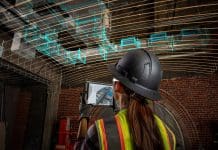With the ever-evolving world of technology, cloud-based ERP such as EasyBuild, has seen a massive uptake by organisations. 78% of organisations consider the cloud to be a critical part of their business strategy. So why is this the case? What benefits does a cloud ERP technology offer and how is it changing the construction industry?
What is cloud-based ERP technology?
ERP stands for enterprise resource planning. Simply put, it is a form of software used by companies to manage information across their organisation. It is used by on-site construction managers and contractors to manage day-to-day activities throughout a project. Software like EasyBuild streamlines the accounting, payroll, the supply chain and project management business functions, integrating them all into one solution.
Cloud-based software is managed off-site by a third-party provider. When connected to the internet, authorised users are able to access information on a shared project wherever they are – whether they are customer-facing, on the construction site or in the office.
This flexible access to the software is only one of the many benefits cloud-based ERP technology offers for construction workers, managers and contractors.
Top 10 benefits of cloud-based ERP for your construction business
1. Increasing ROI
Research has shown that 21% of companies that implemented cloud ERP technology saw an improvement in profitability over a two year period. This was compared with 5.4% of other companies that had used a standard in-house system.
This shows how many opportunities adopting cloud-based ERP presents to reduce business overheads. Having an in-house system comes with a number of expenses, including IT staff salaries, hardware costs, data security and infrastructure maintenance.
Standard ERP software requires ongoing management in order to run effectively. With cloud-based ERP software managed off-site by a third-party provider, the costs of hardware, infrastructure and staff are dramatically reduced.
An industry shift towards cloud-based ERP subscription models shows businesses positively improving their bottom line.
2. Improving efficiency
Companies who integrate cloud ERP technology, like EasyBuild, into their business model see efficiency gains of up to 400%. Some in-house ERP systems can take months, even years, to deploy, a large project investment to any business. Selecting and buying hardware, training up IT staff to use the new system and implement new processes with data security and maintenance is costly.
A cloud-based ERP solution offers a simpler process, making it quicker and easier to implement as it’s carried out remotely by the software provider.
An in-house system requires regular maintenance and update which strains resources and leads to downtime, impacting the construction project delivery. Updates being managed remotely reduces workflow interruptions and ensures business continuity.
The streamlined nature of cloud ERP technology will strengthen working relations across any construction project, improving business efficiency as well as enabling seamless supplier collaborations.
A reliable cloud-based software solution will boost efficiency, leading to timely project completion, within budget, avoiding delivery penalties and disgruntled clients.
3. Accurate reporting
When it comes to reporting and analysis, you won’t get much more accurate information than what cloud ERP technology offers. Systems will offer you real-time information ready for you to review at any time. A good cloud ERP software will have an intuitive interface that makes it easy to dissect data, with information being provided from across the construction project. Throughout a construction project, inevitably issues will be presented to the decision-makers. Accurate reporting allows you to make decisions quickly throughout the project safe in the knowledge that they are being made with the best information available.
4. Scalability
As a successful construction company, you’ll always be looking at ways to scale up. Cloud ERP technology, such as EasyBuild, will integrate well with new systems and components. It gives growing businesses the opportunity to handle the additional workload while managing project costs. With the ability to access information from anywhere in the world, cloud ERP won’t get in your way as you look to expand into other territories.
5. Supply chain management
Supply chains have been increasingly more volatile in recent years. While most strategies are built upon stability and consistency, more companies are moving to a cloud-based system to cope with disruptions. Cloud ERP technology enables a steady flow of goods based on real time data – leading to a more precise supply chain management system.
The visibility that cloud-based ERP software, such as EasyBuild, offers improves the relationship across the supply chain – allowing for a more collaborative effort. It always makes the end-to-end communication between the supplier and the management team much easier. This ensures that a project doesn’t suffer delays as a result of not having sufficient resources.
6. Cost control
Brexit, increased shipping costs and the coronavirus pandemic have all had their hand in the increased price of raw materials. Yet, as we head on the road to recovery, the construction industry is picking up more and more projects. An increase in demand will only go on to further raise costs. Cloud ERP technology is useful in highlighting areas where costs can be cut. In fact, it has even been attributed to a 23% reduction in operational costs. This makes it much more likely to finish a project within budget.
7. Secure data
Any good cloud-based ERP software will have security tools built-in. Providers like EasyBuild have a lot on the line when it comes to security – any fault can be hugely damaging to their reputation. So if there’s a data breach, whether it’s the customer’s fault or provider’s, it’s ultimately the software that will take the fall. With this in mind, vendor’s will have invested a lot into protecting the accessible data on their system. Things to note when looking for a secure cloud solution are;
- Does it operate over a secure HTTPS connection?
- Does it offer authentication best practices?
- Does the provider have a support portal you can contact if an issue arises?
- What’s the provider’s reputation when it comes to security?
8. Artificial Intelligence
Artificial intelligence (AI), which already plays a role within cloud ERP technology, will become more prevalent as it develops. Machine learning allows the system to learn and improve a system without being directed. As the concept becomes more intelligent, the construction process will become more automated and, in some instances, replace the need for human input – reducing the costs further and improving efficiency. For example, the software will highlight that certain stock is low and automatically put an order in for more. This cuts out the time it takes a human to identify low stock levels and place an order.
9. Mobile
Cloud ERP technology will continue to embrace mobile. Users will be able to have the same experience and access the same information on a smartphone or tablet, as they can on a desktop. Typical apps include;
- Timesheets
- Service and maintenance
- Requisitions
- Delivery notes (goods received and returned).
This means that users will be able to capture and input data wherever they are; whether it’s in the office or on a construction site. Improving efficiency and time reporting, information will never have been so readily available.
10. User experience
Gone are the days of a complex-looking ERP system. User experience (UX) is incredibly important for cloud technology, and expectations are constantly being heightened. Clients now want the most stylish, easy-to-use software on the market. As we look to the future, ERP systems will become increasingly user friendly and adapt to the needs of the customer. They are becoming easier to learn for first time users, so everyone on a project has access to the information they need.
Providers spend so much time testing the efficiency and functionality of their ERP solution in order to provide the best user experience. The sheer ease of use of software, such as EasyBuild, makes it a lot easier to view information while on site and make decisions based on the most up to date information.
Summary
Any construction company that is not currently utilising a cloud ERP technology is at risk of being left behind. It will be the companies that have implemented the software that benefit from improved ROI, increased efficiency with the ability to scale up quickly. The ability to view the very latest information empowers decision-makers with the confidence that they are choosing the very best action going forward.
With the use of the cloud, ERP technology has never been able to provide the level of accurate information that it is able to today. This is incredibly important when it comes to cost control and establishing a positive relationship between the construction company and suppliers.
The same report by the Aberdeen Group discussed earlier concluding that; “Based on the performance advantage of Best-in-Class companies, following their lead and preference for a cloud-based SaaS ERP solution makes a compelling case for all companies to strongly consider using a cloud-based ERP for their business moving forward”.
EasyBuild’s award-winning construction ERP software enables users to work within a single, centrally sourced, up-to-date information model in real-time. If you’re looking to join the rest of the construction industry in the cloud arena, then get in touch and let’s chat today.








![[VIDEO] Why it’s time to digitalise your door inspections Digitalising your fire door inspections ensures increased efficiency and compliance- guaranteeing peace of mind for your company and clients](https://www.pbctoday.co.uk/news/wp-content/uploads/2024/09/JPZ_2347-2-XL_clean-B-218x150.jpg)





